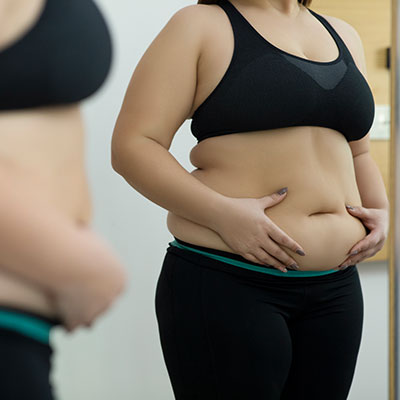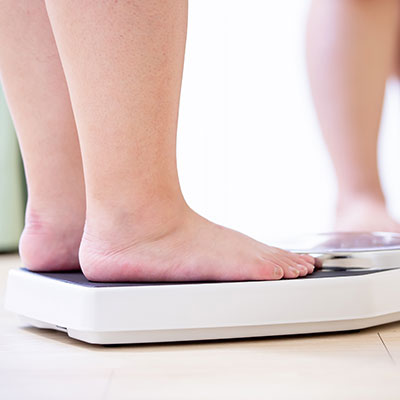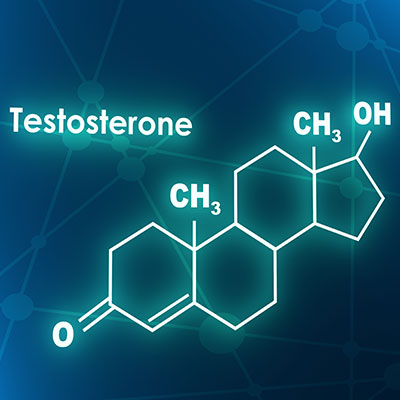Testosterone and Visceral Fat in Women
Contents

Visceral fat is commonly referred to as “belly fat.” However, the true definition of visceral fat literally goes a lot deeper than that. Visceral fat technically is fat that wraps around your abdominal organs deep inside your body. While people who are noticeably overweight with a typical “big belly” will undoubtedly also have a lot of visceral fat, you can’t always feel it or see it. In fact, you can have a fairly flat tummy and still have visceral fat. That’s sometimes called TOFI, or “thin outside fat inside.”
The link between visceral fat and low testosterone is an interesting one. Studies have found that both men and women who are overweight and possess an excessive volume of visceral fat tend to suffer from low testosterone. The reverse has also been found to be true that people with low testosterone tend to be overweight and have a lot of visceral fat.
However, it is unclear if having low testosterone levels causes increased weight gain and deposits of visceral fat or if having large amounts of visceral fat causes low testosterone.
Either way, we know that the two conditions – large amounts of visceral fat and low testosterone – go hand and hand and that this is especially true in women.
Women, Visceral Fat and Testosterone
Testosterone is, of course, a “male hormone.” However, women’s bodies make and need testosterone as well. The “normal” level of testosterone for a woman is significantly lower than that of a man, but testosterone is no less important for females.
In women as well as men, testosterone is critical for fat metabolism and for building lean muscle mass. It is important for bone density, libido, or sex drive. In addition, testosterone boosts strength and decreases body fat – especially visceral fat.
Women tend to gain weight and particularly put on “belly fat” or visceral fat as they enter the menopausal years. This is also the time that women lose most of their testosterone. There is mounting evidence that the two conditions are related.
In middle-aged women, visceral fat, more commonly called belly fat, is known to be a significant risk factor for cardiovascular disease and other health problems. But why does belly fat tend to accumulate at this age?
Doctors used to attribute this accumulation of belly fat among middle-aged women to simply “getting older” and the slowed metabolism and other issues that come with aging.
However, current research seems to suggest that the cause is likely not age but the change in hormone balance that occurs during perimenopause and menopause -in particular, the loss of testosterone that occurs and its impact on weight and metabolism.
The lead researcher on a recent study looking at middle-aged women, visceral fat, and testosterone said, “Of all the factors we analyzed that could possibly account for the increase in visceral fat during this period in a woman’s lifetime, levels of active testosterone proved to be the one most closely linked with abdominal fat,” said Imke Janssen, Ph.D., assistant professor of preventive medicine at Rush University Medical Center.
Weight Gain as a Result of Low Testosterone Levels

In women as well as in men, testosterone helps you to build and maintain lean muscle. Muscle helps to raise your metabolism. Lack of lean muscles due to low testosterone leads to weight gain, particularly belly fat.
Women with low testosterone face the same causes of weight gain as do men. However, they also have more of a unique problem with testosterone and weight gain. Testosterone plays a significant role for women who gain excess visceral fat when their testosterone levels decrease. But the relationship between testosterone and weight gain is a little more complex in females than it is in males.
Women tend to gain weight easier than men because of higher levels of estrogen. As women enter their menopausal years, levels of estrogen and progesterone, the female sex hormones, begin to fluctuate. Estrogen tends to become dominant, and this can often lead to weight gain.
As women enter menopause, any “extra” testosterone they have remaining in their blood tends to convert to estrogen. There is a direct correlation between elevated estrogen and disorders involving obesity.
How Does Testosterone Help Women Lose Weight?
Increasing a woman’s testosterone level through testosterone replacement therapy can certainly help a woman to lose weight. Testosterone therapy can increase lean muscle, which in turn can boost metabolism and burn more fat.
In addition, testosterone replacement provides more energy, which means women can be more active. It also can reduce anxiety, depression, and stress, all of which can aid in weight loss.
Besides helping them to lose weight, there are many other benefits of testosterone replacement for women include. When properly prescribed and carefully monitored, testosterone therapy in women has been shown to:
- Improve bone health
- Increase libido and sexual health
- Improve energy
- Improve muscle tone
- Reduce fat, particularly belly fat
- Improve mental focus
- Reduce urinary urgency and or/incontinence
- Reduce vaginal dryness
- Reduce the incidence of hot flashes and night sweats
In addition, there was a German study that found that testosterone therapy in women may decrease the risk of a cardiovascular incident such as a stroke or heart attack, and unlike previous thinking, more recent research seems to suggest that testosterone therapy in women may, in fact, reduce the risk of breast cancer.
How Testosterone Increases Your Metabolism

When testosterone is released throughout your body, it interacts with special receptors that coat your muscle cells known as “androgen receptors.” As soon as a testosterone molecule binds to one of these receptors, a chain reaction begins. The receptor sends a signal deep into the cell, triggering the cell to make more protein. This protein is the building block for muscle fibers. So, the more testosterone you have, the more muscle mass you’ll have. Muscle mass keeps your metabolism high because even muscle at rest requires high amounts of energy.
Testosterone is also instrumental in the process of lipolysis or the burning of fat. Keeping testosterone levels high will help you to burn more fat rather than store it as visceral fat.
Studies On Testosterone and Visceral Fat in Women
The aforementioned study conducted by the Rush University Medical Center was Trusted sourceTestosterone and Visceral Fat in Midlife WomenNCBIGo to sourcepublished in 2010 in the medical journal Obesity.
This landmark study on women’s visceral fat and testosterone looked at 359 women in menopausal transition, ages 42 to 60. Fat in the abdominal cavity was measured with CT scans, a more precise measurement than waist size. Blood tests were used to assess levels of testosterone and estradiol (the main form of estrogen). Medical histories covered other health factors possibly linked with an increase in visceral fat.
Dr. Janssen and her team showed that the level of “bioavailable” testosterone, or testosterone that is active in the body, was the strongest predictor of visceral fat in these women.
Now that you know a bit more about testosterone and visceral fat in women, why not contact us today, and find out more about the many life-changing benefits of testosterone replacement therapy.
FAQ
What Is Visceral Fat?
Visceral fat is a type of body fat that’s stored within the abdominal cavity. It’s located near several vital organs, including the liver, stomach, intestines. It is often referred to as "belly fat" because of its build-up around these organs. But it can also build up in the arteries.
Why Is Visceral Fat Dangerous?
Of course, too much of any kind of body fat poses health risks, but visceral fat or abdominal fat is particularly dangerous. Too much of any body fat is bad for your health. But compared to the fat that lies just underneath yourskin(subcutaneous fat), the visceral kind is more likely to raise your risk for serious medical issues. Heart disease, Alzheimer’s, type 2 diabetes, stroke, and high cholesterol are some of the conditions that are strongly linked to too much fat in your trunk.
Furthermore, as indicated on these pages, there is a link between high levels of visceral fat and lower levels of testosterone.
What Foods Increase Visceral Fat?
As you might expect, all of the foods that are generally considered "unhealthy" all increase your level of visceral fat. One of them is trans fats, which are found in meats and dairy as well as in deep-fried or processed foods. Also bad are sodas, candy, processed baked goods, and other foods sweetened with fructose.
What Is the Normal Level of Visceral Fat?
A healthy body should have less than 1.0 for men or 0.85 for women. A good indicator of having a high level of visceral fat is a high BMI score (Body Mass Index) and a large waist. If you have both, chances are likely that you have a high level of visceral fat.
What Is the Relationship Between Visceral Fat and Low Testosterone?
Several studies have shown a strong link between low testosterone and visceral fat. In recent years, medical science has recognized the links between low testosterone and other medical conditions. Most notably, men with low testosterone tend to suffer from various "metabolic conditions," such as diabetes, high blood pressure, and heart disease.
Men with low testosterone also tend to be overweight and, in particular, carry a large amount of visceral or "belly fat." A recent study found that men over 45 who were obese were three times as likely to have low testosterone than men of the same age who were of average weight.
How Can You Reduce or Eliminate Visceral Fat?
Eating smart and regular exercise are the surest ways to reduce or eliminate visceral fat. Studies suggest that more calcium and vitamin D in your body may be linked to less visceral fat. So load up on leafy greens like collards and spinach. Tofu and sardines are also good picks. And follow the usual rules for healthy eating, with lots of fresh produce, whole grains like wheat breads and oatmeal, and lean protein like skinless chicken, fish, eggs, beans, and low-fat dairy.
Also, as we have indicated on these pages, testosterone therapy in men and women who have been diagnosed with low testosterone could help to reduce or eliminate visceral fat.






